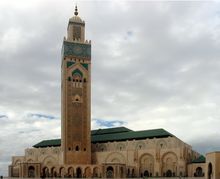 Rules and etiquette
Rules and etiquette
Mosques, in accordance with Islamic practices, institute a number of rules intended to keep Muslims focused on worshipping Allah. While there are several rules, such as those regarding allowing shoes in the prayer hall, that are universal, there are many other rules that are dealt with and enforced in a variety of ways from mosque to mosque.
Prayer leader

Appointment of a prayer leader is considered desirable, but not always obligatory.. The permanent prayer leader (imam) must be a free honest man, who has learned the Qur'an by heart and is authoritative in religious matters. In mosques constructed and maintained by the government, the prayer leader is appointed by the ruler; in private mosques, however, the appointment is done by the members of the congregation through majority voting. According to the Hanafi school of Islamic jurisprudence, the man who built the mosque has a stronger claim to the title of imam, but this view is not shared by the other schools.

Leadership at prayer falls into three categories, depending on the type of prayer: five daily prayers, Friday prayer, or optional prayers. According to the Hanafi and Maliki school of Islamic jurisprudence, appointment of a prayer leader for Friday service is mandatory because otherwise the prayer is invalid. The Shafi'i and Hanbali schools, however, argue that the appointment is not necessary and the prayer is valid as long as it is performed in a congregation.

A slave may lead a Friday prayer, but Muslim authorities disagree over whether the job can be done by a minor. An imam appointed to lead Friday prayers may not also lead at the five daily prayers; however, Muslim scholars disagree as to whether the leader appointed for five daily services may lead the Friday service as well.

All Muslim authorities hold the consensus opinion that women may not lead prayer. Recently, the rule was relaxed in some places in China, where women have been allowed to lead prayer in front of all-female congregations. There have been a few women, most notably Amina Wadud, who have defied the ruling and have opted to lead mixed-gender prayers and Friday prayers.
 Cleanliness
Cleanliness
All mosques have rules regarding cleanliness, as it is an essential part of the worshipper's experience.
(People must remove their shoes when entering the prayer hall )

Muslims before prayer are required to cleanse themselves in an ablution process known as wudu. However, even to those who enter the prayer hall of a mosque without the intention of praying, there are still rules that apply. Shoes must not be worn inside the carpeted prayer hall.

Some mosques will also extend that rule to include other parts of the facility even if those other locations are not devoted to prayer. Congregants and visitors to mosques are supposed to be clean themselves. It is also undesirable to come to the mosque after eating something smelly.
Dress

Islam requires that its adherents wear clothes that portray modesty. As a result, although many mosques will not enforce violations, both men and women when attending a mosque must adhere to these guidelines. Men are supposed to come to the mosque wearing loose and clean clothes that don't reveal the shape of the body. Likewise, it is recommended that Muslim women wear loose clothing, shirts, and pants that cover to the wrists and ankles.

Many mosques will require that non-Muslim female visitors also wear a scarf to cover the head in the style of the Islamic hijab. Middle eastern clothing often associated with Islam is not necessary, although many Muslims, regardless of their ethnic background, will wear them to special occasions and prayers at mosques.
Concentration

As mosques are places of worship, those within the mosque are required to remain respectful to those in prayer. Loud talking within the mosque, as well as discussion of topics deemed disrespectful, is forbidden in areas where people are praying. In addition, it is disrespectful to walk in front of or otherwise disturb Muslims in prayer. The walls within the mosque have few items, except for possibly Arabic calligraphy, so Muslims in prayer are not distracted. Muslims are also discouraged from wearing clothing with distracting images and symbols so as not to divert the attention of those standing behind them during prayer.
Gender separation

Islamic law requires men and women to be separated in the prayer hall; ideally, the women must occupy the rows behind the men. Muhammad preferred women to pray at home rather than at a mosque, and according to the hadith Muhammad said: "The best mosques for women are the inner parts of their houses." The second caliph Umar went so far as to prohibit women from attending mosques and required them to pray at home.

Sometimes a special part of the mosque was railed off for women; for example, the governor of Mecca in 870 had ropes tied between the columns to make a separate place for women. Many mosques today will put the women behind a barrier or partition or in another room. Mosques in South and Southeast Asia put men and women in separate rooms, as the divisions were built into them centuries ago. In nearly two-thirds of American mosques, women pray behind partitions or in separate areas, not in the main prayer hall; some mosques do not admit women at all. Almost a quarter of the mosques do not offer programs for women, and a third do not allow women on governing boards.

The large crowds present at the Masjid al-Haram in Mecca, especially during the annual pilgrimage, often result in unintended mixing between genders. Some Islamic jurists would prefer to exclude women from prayer halls altogether.
Women are subjected to other restrictions in mosques. According to some hadith, they must not be perfumed; according to others, they must leave the mosque before the men.
Non-Muslims in mosques

The Hassan II Mosque in Casablanca is one of two mosques in Morocco open to non-Muslims.Under most interpretations of Islamic law, non-Muslims may be allowed into mosques, as long as they do not sleep or eat there; the dissenting opinion is presented by the followers of the Maliki school of Islamic jusrisprudence, who argue that non-Muslims may not be allowed into mosques under any circumstances.

(click to enlarge - The Hassan II Mosque in Casablanca is one of two mosques in Morocco open to non-Muslims. )

The Qur'an addresses the subject of non-Muslims, and particularly polytheists, in mosques in two verses in its ninth chapter, Sura At-Tawba. The seventeenth verse of the chapter prohibits those who join gods with Allah — polytheists — from entering mosques:

It is not for such as join gods with Allah, to visit or maintain the mosques of Allah while they witness against their own souls to infidelity. The works of such bear no fruit: In Fire shall they dwell. (Yusuf Ali 9:17)
The twenty-eighth verse of the same chapter is more specific as it only considers polytheists in the Sacred Mosque, the Masjid al-Haram in Mecca:
Quote:
|
O ye who believe! Truly the Pagans are unclean; so let them not, after this year of theirs, approach the Sacred Mosque. And if ye fear poverty, soon will Allah enrich you, if He wills, out of His bounty, for Allah is All-knowing, All-wise. (Yusuf Ali 9:28)
|

According to Ahmad ibn Hanbal, these verses were followed to the letter at the times of Muhammad, when Jews and Christians, considered monotheists, were still allowed to the Masjid al-Haram. However, the Umayyad caliph Umar II later forbade non-Muslims from entering mosques, and his ruling remained in practice in Saudi Arabia.

Today, the decision on whether non-Muslims should be allowed to enter mosques varies. With few exceptions, mosques in the Arabian peninsula as well as Morocco do not allow entry to non-Muslims. For example, the Hassan II Mosque in Casablanca and the Moulay Ismael Mosque in Meknes are the only two mosques in Morocco currently open to non-Muslims.

However, there are also many other places in the west as well as the Islamic world where non-Muslims are welcome to enter mosques. Most mosques in the United States, for example, report receiving non-Muslim visitors every month. Many Mosques throughout the United States welcome non-Muslims as a sign of openness to the rest of the community as well as to encourage conversions to Islam.

In modern-day Saudi Arabia, the Masjid al-Haram and all of Mecca are open only to Muslims. Likewise, the Masjid al-Nabawi and the city of Medina that surrounds it are also off-limits to those who do not practice Islam.

For mosques in other areas, it has most commonly been taken that non-Muslims may only enter mosques if granted permission to do so by Muslims and if they have a legitimate reason. All entrants regardless of religious affiliation are expected to respect the rules and decorum for mosques.

At different times and places, non-Muslims living under Muslim rule were required to demonstrate deference to mosques. In most cities of Morocco, Jews were required to remove their shoes when passing by a mosque Danish traveler Carsten Niebuhr wrote that in 18th-century Egypt Jews and Christians had to dismount before several mosques in veneration of their sanctity.[